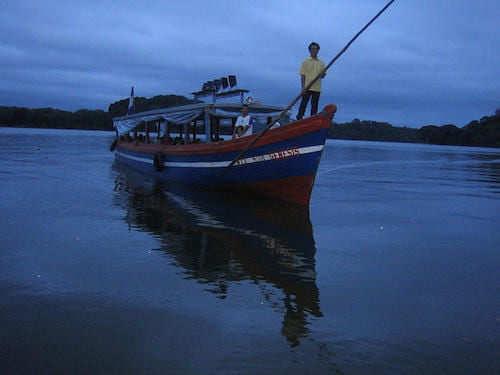Nicaragua, Land of Poets
To my mom, Yelbita Balmaceda Vivas
(06.24.1950 – 01.28.2019)
On July 19, 2019, Nicaragua commemorates the 40th anniversary of what is considered to be one of the last and greatest social revolutions of Latin America’s 20th century: the Sandinista Revolution (1979-1990). In accordance with the tradition inaugurated by the great Nicaraguan poet Ruben Darío (1867-1916), during the months leading up to the uprising and during the years that followed the revolutionary triumph, Nicaraguans turned to poetry to celebrate the end of the Somoza dynasty and what they envisioned would be a new era of social, cultural and political transformations. Poetry acquired a popular and social character, and poets of both sexes composed and read collectively verses that spoke of a new patria libre in which men and women could exercise their rights as citizens within a truly sovereign and egalitarian country.
The story of the Sandinista Revolution’s demise is well known. A civil war divided the country, and a U.S.-sponsored counter-revolution, together with a debilitated governing elite, contributed to undermine the promises and possibilities of social and political change. Nicaragua’s truncated transition to democracy, together with a series of structural adjustments during the 1990s, gave rise to a period marked by economic inequality, corruption, weak institutions and political divisions. Just as in its neighbouring countries, Nicaragua entered a period of profound democratic disenchantment.
The return of former Sandinista president Daniel Ortega to the presidency in 2007 benefited from, and contributed to, this democratic disenchantment. A populist who uses both coercion and co-optation to maintain his power, Daniel Ortega continues to utilize his former anti-imperialist and anti-capitalist rhetoric but has now become a firm promoter and beneficiary of the neoliberal policies that have had a huge impact on the lower and middle sectors of society. He has furthermore dismantled the country’s already weakened democratic institutions in a steady and dramatic manner. In April 2018, a series of protests that quickly spiralled into more radical and revolutionary demands were brutally repressed by both state and paramilitary forces. Ortega’s use of brute force against students and young people left a deep mark in the Nicaraguan people, including former and current Sandinistas. In spite of an incipient process of dialogue between opposition forces and Ortega’s government, social activists, journalists and other public figures continue to be harassed, supressed and forced to exile.
Today, as yesterday, Nicaraguans have turned to poetry in order to articulate their aspirations and desires for a free Nicaragua. Political dissent might be provisionally silenced, but poetry will continue to speak the words of hope and change our country so badly needs.
Nicaragua, tierra de poetas
Por Gema Santamaría
A mi mamá, Yelbita Balmaceda Vivas
(06.24.1950 – 01.28.2019)
Este 19 de julio de 2019 se conmemora el cuarenta aniversario de la que es considerada una de las últimas y más importantes revoluciones sociales del siglo XX latinoamericano: la Revolución Sandinista de Nicaragua (1979-1990). Siguiendo la tradición inaugurada por el gran poeta nicaragüense Rubén Darío (1867-1916), durante los meses previos al estallido de la revolución y los años que le siguieron al triunfo, los y las nicaragüenses se volcaron a la poesía para celebrar el fin de la dinastía Somoza y el inicio de lo que ellos anhelaban sería una nueva era de transformaciones sociales, culturales, y políticas. La poesía adquirió un tono popular y social, y poetas de ambos sexos crearon y leyeron colectivamente versos que hablaban de una nueva patria libre en la que mujeres y hombres pudieran ejercer sus derechos como ciudadanos dentro de un país verdaderamente soberano e igualitario.
La historia del declive de la Revolución Sandinista es bien conocido. Una guerra civil que dividió al país, junto con una contra-revolución apoyada por Estados Unidos y una élite gobernante débil, contribuyeron a mermar las promesas y posibilidades de un cambio social y político en el país. La transición incompleta de Nicaragua hacia la democracia, junto con una serie de ajustes estructurales durante los 1990, dieron lugar a un periodo marcado por la desigualdad económica, corrupción, debilidad institucional y profundas divisiones políticas. Al igual que sus países vecinos, Nicaragua entró en un periodo caracterizado por un profundo desencanto democrático.
El regreso del ex presidente sandinista Daniel Ortega al poder en 2007 se nutrió y ha contribuido a dicho desencanto democrático. Un populista que hace uso de la coerción y la cooptación para mantenerse en el poder, Daniel Ortega continúa utilizando su anterior retórica anti-imperialista y anti-capitalista mientras en la práctica se ha convertido en un firme promotor y beneficiario de las políticas neoliberales que han perjudicado a los sectores medios y populares de la sociedad. Ortega ha además desmantelado las ya de por sí débiles instituciones democráticas del país de una manera dramática. En abril de 2018, una serie de protestas que se convirtieron rápidamente en demandas más radicales y revolucionarias fueron reprimidas brutalmente tanto por fuerzas estatales como para-militares. El uso de la fuerza por parte de Ortega en contra de estudiantes y jóvenes causó una fuerte y negativa impresión entre los nicaragüenses, incluidos aquellos que se identificaban y continúan identificándose con el sandinismo. A pesar de un incipiente proceso de diálogo entre las fuerzas de oposición y el gobierno de Ortega, activistas sociales, periodistas, y otras figuras públicas continúan siendo acosados, reprimidos y forzados al exilio.
Hoy, como ayer, los nicaragüenses se han volcado a la poesía en aras de articular sus aspiraciones y deseos por una Nicaragua libre. La disidencia política podrá ser silenciada provisionalmente, pero la poesía continuará pronunciando las palabras de esperanza y cambio que el país tanto necesita.
Spring/Summer 2019, Volume XVIII, Number 3
Gema Santamaría is Assistant Professor of Latin American History at Loyola University, Chicago. Her research focuses on questions of violence, justice and the rule of law in Latin America. She was born in 1979, the year of the revolution, in Managua, Nicaragua. She is the author of Piel de Poesía (Managua-México, 400 Elefantes-Opción, 2002), Antídoto para una mujer trágica (México, Mezcalero Brothers, 2007) and Transversa (México, Proyecto Literal, 2009). Her work has been translated to English, Portuguese, French, and German. She edited, together with poets Lauri García Dueñas and Jocelyn Pantoja, the poetry anthology Apresurada cicatriz: instantáneas de poesía centroamericana (México, Proyecto Literal, 2013). She is a member of the Nicaraguan Association for Women Writers (ANIDE).
Gema Santamaría es Profesora Asistente de Historia de América Latina en Loyola University, Chicago. Su investigación se centra en temas de violencia, justicia, y estado de derecho en América Latina. Nació en 1979, el año de la revolución, en Managua, Nicaragua. Es la autora de Piel de Poesía (Managua-México, 400 Elefantes-Opción, 2002), Antídoto para una mujer trágica(México, Mezcalero Brothers, 2007) y Transversa (México, Proyecto Literal, 2009). Su poesía ha sido publicado al inglés, portugués, francés y alemán. Es editora, junto con las poetas Luari García Dueñas y Jocelyn Pantoja, de la antología de poesía Apresurada cicatriz: instantáneas de poesía centroamericana (México, Proyecto Literal, 2013). Es integrante de la Asociación Nicaraguense de Escritoras (ANIDE).
Related Articles
The University and the Nicaraguan Crisis
English + Español
University youth were the first to rise up in April in Nicaragua. Then other young people followed en masse, followed by the rest of the population. The young students woke up an entire country. “They are students; they are not delinquents!” became the first slogan that…
Nicaragua TEMPLATE: Single Language Article
English + Español
A one or two sentence blurb about the article
3, 2, 1… poemas
Manual para sobrevivientes…





